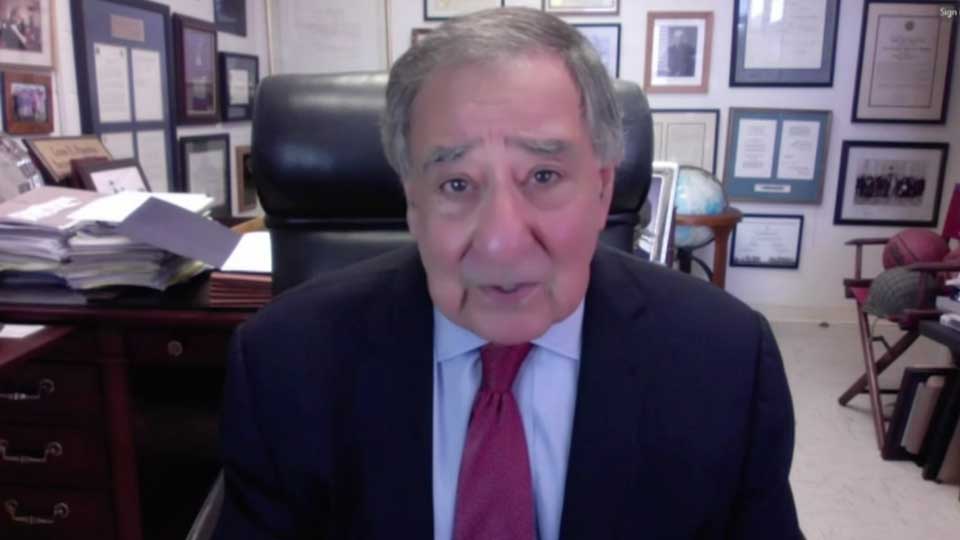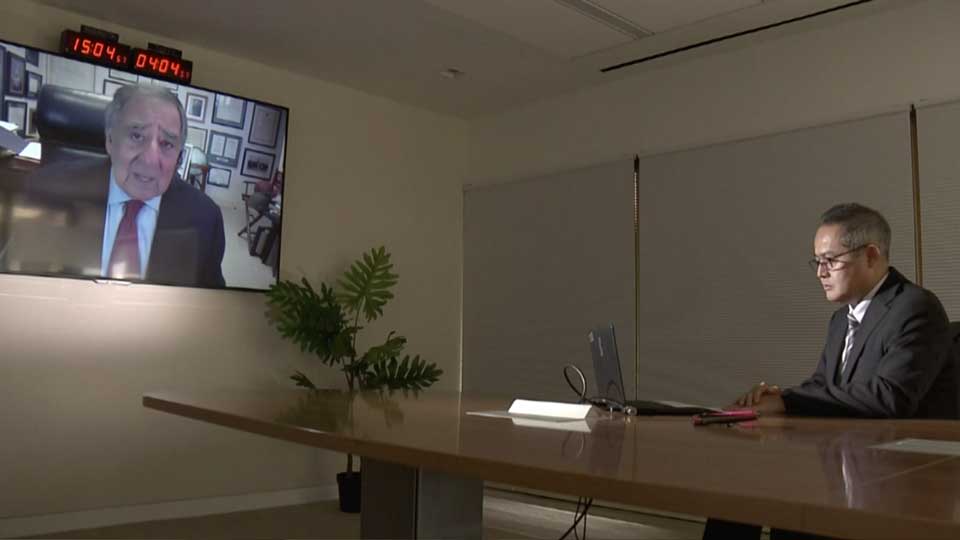Takagi Masaru: The United States vetoed a UN Security Council resolution led by Brazil on Wednesday that would have called for a humanitarian pause in order to deliver aid to Gaza. How do you view the reactions from some in the international community calling this veto a double standard by the US in its support of Israel? What is your view regarding the significance of the growing number of anti-Israel protests worldwide and here in the United States?
Leon Panetta: Beginning with your last question first. When there's an area in the world that is at war, obviously it creates a lot of very different views about that war. So, I think all of us who are in democracies understand that people will exercise their right to protest on very different issues. So, I'm not surprised that there would be protests here. I'm sure that they'll continue because there are a lot of groups that are concerned about war, and so they'll urge a ceasefire, they'll urge all kinds of other steps.
Israel was brutally attacked by Hamas terrorists, brutally attacked, I've never seen that kind of savagery, where 1,400 Israelis were basically savaged by these terrorists. I think Israel does have the right, like any country, to be able to defend itself. And that's what the United States did on September 11. When we were attacked, and 3,000 people were killed in this country, we went to war against al Qaeda and those involved in that attack.
Takagi: So how can the US respond to the criticism of its double-standard in its veto yesterday?
Panetta: I think President Biden has made pretty clear that the United States supports humanitarian aid to the Palestinians. As a matter of fact, it's the President of the United States who talked to President Abdel Fattah el-Sisi in Egypt and got him to allow a number of trucks of humanitarian aid to be able to go into Gaza and provide humanitarian aid.
So, this is not an issue of whether or not you support humanitarian aid. The United States has made clear that we support humanitarian aid. I think the real issue involved with the UN was an effort to basically try to get back at Israel and try to embarrass Israel. And I think it's for that reason, frankly, that the United States supported Israel's position.
Takagi: Why do you believe the United States still needs to support an Israel-led ground invasion, considering the increase in anti-Israel protests worldwide?
Panetta: Well, I think your premise is mistaken. The United States has not taken a position with regard to what kind of military tactics Israel ought to implement in order to protect itself.
Israel has called up 300,000 reservists, they've obviously mobilized a force. But the principal objective here is to go after those who were involved in this attack on Israel. The terrorists that were involved. And so, their primary mission is to go after Hamas, and the leadership of Hamas. And I think that's a legitimate objective when Hamas is responsible for having attacked Israel.
And, as to what approach they take, I think that's obviously a decision that the Israelis are now trying to determine. I mean, there's a number of approaches. One, obviously, is to invade Gaza. Which would be a long and prolonged war that would obviously involve a lot of casualties. The other approach is to establish some kind of buffer area in Gaza, and then target Hamas leadership and go after those targets. And also, try to see if we can take steps to retrieve the hostages who have been taken. I think that really ought to be the primary objective here for Israel.
Takagi: But, once that ground invasion begins, how long do you believe it will continue? And what should we watch for? You've suggested several points already. What is the likely scenario, or conclusion, of the ground invasion of Gaza? And how will it affect the region?
Panetta: Well, you know, again, we don't know what decision Israel will ultimately make as to how it approaches the issue of Gaza. I think President Biden has made clear that it's not wise for Israel to establish a force there that tries to maintain control of Gaza. The effort here is to go after Hamas and the leadership of Hamas.
And so, I think the international effort ought to be to try to persuade the Palestinians to promote strong leadership that would be able to govern, not just the West Bank, but Gaza as well. That really ought to be the goal.
In the end, this still has to be about trying to allow Israel and the Palestinians the ability to live in that part of the world together.
Takagi: The view in many parts of the world, including in Japan, is that it appears Israel and the United States are heading towards disaster together. Even if humanitarian aid can be delivered to Gaza, once the ground invasion starts, many believe that Israel will not be able to avoid a humanitarian crisis. So, what are the challenges for US Middle East policy at this moment?
Panetta: I know Israeli Prime Minister Benjamin Netanyahu has talked about going in and crushing Hamas. But the reality is that I think he and the military leadership in Israel are trying to decide on what the best strategy is. And the United States basically supports Israel's right to protect and defend itself.
Takagi: It's been noted that for the United States, the importance of the Middle East has been geopolitically low. As a result, US involvement in the Middle East has been gradually declining. Some say this may be an indirect reason for the current conflict between Palestine and Israel. What's your view on this?
Panetta: Well, I think of the United States during the Donald Trump administration. President Trump made the decision to try to withdraw from the rest of the world. And try to — he talked about America first and talked about, basically, backing off of our alliances. I think that was a terrible mistake. And it sent the wrong message to the world.
But President Biden has made clear that the United States is going to continue to provide world leadership. We've been providing world leadership since World War Two. And I think it's important for the United States to continue to provide that leadership.
If the United States doesn't lead in the world, frankly, nobody else will. And so, it's very important for the United States to be a world leader, and to make clear that we will work with our allies. Whether it's in dealing with threats from North Korea, as we do in our relationship with Japan and South Korea, trying to make sure North Korea does not attack South Korea. We are establishing an alliance in NATO to try to be able to make clear to Putin that he should not attack a sovereign democracy. We are establishing a strong alliance in the Pacific to deal with China. And we have a Middle East alliance to try to deal with Iran.
So, I think the world needs to be able to work together to confront common enemies. This is a dangerous world right now. And so, I really believe that it's important for the United States to be able to continue to work with our allies in order to make sure that we try to preserve peace and prosperity in the world.

Takagi: Some in Gaza (are criticizing US) Middle East policy, because they expected the United States to assume a deeper role in acting as a mediator between Israel and Palestine. From your past experience in international security policy, how do you evaluate this criticism of the United States by the Palestinians?
Panetta: I believe the United States needs to always have the position of being a mediator between Israel and the Palestinians. I think that's an important position for the United States to maintain.
When I worked for President Bill Clinton, he basically tried to serve as a mediator in trying to advance peace in the Middle East. It's probably the closest we've ever come to the possibility of Palestinians being able to accept their own separate state. But unfortunately, the leader of the PLO (Palestine Liberation Organization) Yasser Arafat refused to do that.
And then I think what happened is, we have presidents who decided that because it was kind of an impossible task, it would be difficult for the United States to serve, and continue to serve, as a mediator. I think that was a mistake.
I think the reality is that the United States has the credibility to try to work with both Israelis and Palestinians, to try to ultimately get a two-state solution in which the Palestinians have their state and Israel has its country. That ultimately is going to be the only way we can resolve the issues there. But it requires that the United States maintain credibility with both sides.
Takagi: Is there a possibility, in your view, that the United States will take military action in the coming days or weeks? Under what conditions would this occur?
Panetta: The President's made very clear to Hezbollah in Lebanon, another terrorist group that is supported by Iran; it's made very clear to Iran, which is a country that continues to support terrorism and undermine stability in the Middle East. He has made it very clear to them that they should not get involved in this war, and expand the war.
That's why we have two carrier fleets in the Mediterranean. That's why we've just deployed 2,000 troops to that part of the world. It's to make it very clear to other terrorists that they should not get involved in expanding this war. And that if they do, the United States will make clear that they will pay a price.
Takagi: Are you optimistic this crisis can be resolved successfully?
Panetta: I am. And the reason I am is because I think morally, we are in the right place. We believe that people ought to have the right to decide their future, we believe in human dignity, and we believe in human rights and freedoms. And I think that's what the world wants.
And we have a moral responsibility, and we have a responsibility as countries who are protecting that kind of moral freedom. I think we do have to work together to build our military, to build our diplomatic capability, and to, most importantly, strengthen our alliances.
Takagi: Why do you believe Hamas launched such a massive attack against Israel on October 7? What did Hamas aim to achieve with this massacre?
Panetta: I think we learned from terrorists that they operate by fear. And they operate by killing innocent men, women, and children in the way that they do... in order to strike fear in the hearts of others and to try to intimidate others. That somehow, what they believe is more important than the freedoms and liberties. So, I think Hamas waged this attack to basically make clear that terrorism is going to do everything it can to undermine democracy and to undermine freedom.
September 11 was about that. Al Qaeda believed that the United States and our democracy ought to be undermined, it ought to be attacked. And they did. And killed 3,000 innocent people. But the United States went to war against Al Qaeda. And ultimately, we got rid of their leadership. We got rid of those terrorists.
And so, from my point of view, having been involved in going after Al Qaeda leadership, particularly Osama Bin Laden, I understand Israel wanting now to go after Hamas. To make sure they never do this again. And that's why we support their ability to try to protect their country. Because terrorists, frankly, whether it's in any part of the world, we cannot allow terrorists to kill innocent men, women, and children. That cannot be allowed.
Takagi: President Biden has been trying to promote the normalization between Saudi Arabia and Israel. Do you think this diplomatic effort of normalization made Hamas decide to act in such a brutal way, eventually?
Panetta: Yes, I think that may have very well been part of it. They did not support the Abraham Accords. They didn't support moderate Arab countries moving to recognize Israel. They believe, frankly, that Israel doesn't have a right to exist.
And so, they're not going to support efforts by countries that are trying to not only recognize Israel but try to work together to be able to provide a state for the Palestinians. That's really the hope that I think most people in the world have for the Middle East. To be able to find that kind of peaceful solution to an area that, you know, has been in conflict going back to 1948.
And so, I think it's important for the United States and for modern Arab countries to continue the effort to try to develop the Abraham Accords. And I hope we're able to continue to do that.
I mean, right now, unfortunately, there isn't Palestinian leadership. And there certainly wasn't leadership in Gaza, because terrorists basically controlled Gaza.
So ultimately, if we're going to have a Palestinian state, we have got to have strong Palestinian leadership that can govern that state and provide for their security.


